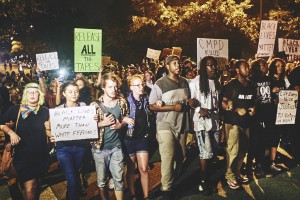A Humanist Response to Charlotte Unrest and White Complacency
Police shot and killed Keith L. Scott, a Black father of seven with a prior traumatic brain injury, while his wife Rakeyia Scott filmed from less than a block away. Scott’s death on September 20 in Charlotte, North Carolina, happened days after police killed another black man, Terence Crutcher in Tulsa, Oklahoma, as Crutcher walked toward his broken-down vehicle, arms over his head. Since just the beginning of this summer, our country has lost sixty-nine Black lives at the hands of police officers, which has led to escalating outrage, anxiety, and hopelessness among members of the Black community. Discrepancies between police reports and witness accounts, along with a lack of justice when officer misconduct is evident, contribute to the growing distrust many Black folks have toward law enforcement and the justice system.
Within hours of Scott’s death, protesters gathered in the streets of Charlotte. In two days of demonstrations, one man was arrested and another seriously injured. From the unrest in Charlotte, a movement called CharLIT Uprising emerged, “a coalition of community members local and state organizers committed to ensuring the safety of their communities, and advocating for police accountability, transparency, and social and economic equity.” CharLIT Uprising calls on the Department of Justice, Charlotte City Council, and Governor Pat McCrory to render justice for Scott and “all black people murdered by cops.”
Meanwhile, there is a startling contrast in the discourse online among white people in regards to the events in Charlotte and the persistent racial injustice across America—a tone that falls somewhere between deafening silence and furious vitriol. Simply scan any thread of comments on articles about Black Lives Matter or the recent uprisings against police misconduct and violence toward the Black community, and you see depraved responses from white people that range from covert microaggressions to flagrant racism and hate.
This behavior extends to more prominent white people in political positions. United States Representative Robert Pittenger (R-NC), whose district includes parts of Charlotte, said in an interview with the BBC that the protesters “hate white people because white people are successful and they’re not.” Another politician, Representative Tim Huelskamp (R-KS), called protesters “hoodlums” and “criminals” on Twitter. Glenn Reynolds, professor at University of Tennessee College of Law and contributor to USA Today tweeted, “Run them down,” after reports that protesters blocked traffic on I-227. Even Mike Pence, Republican vice-presidential candidate, said there was “far too much of this talk of institutional bias or racism within law enforcement.”
This callous disregard and lack of awareness is not an isolated perspective. Instead, it reflects a common narrative among a majority of white people in this country. There is a disconnect between what Black people share of their experiences with systemic racism and injustice and what we white people internalize. This is in part because of how mainstream media chooses to frame Black victims of police violence, but it also stems from a narrow understanding of the role cultural positionality and racial privilege play in shaping our worldview.
Most of us live immersed within communities of other “well-meaning” white people who ignore the need to examine how whiteness and privilege shield us from tragedies like those that happened to Terence Crutcher or Keith Scott. As white people, we share the luxury of not having to endure the ramifications of everyday life remaining the same. This makes it easy for us to dehumanize the Black experience and reproach their anger and concerns. We white people create a casual distance from personal accountability as it relates to how our words and actions uphold systems that oppress Black people and forgive police brutality and murder. It is easy to criticize a movement when you have nothing at stake and when you are conditioned to believe that those fighting for their lives are inherently bad, criminal, less deserving, or simply “hate white people” for their success.
To be part of the solution, we must identify misguided beliefs and internal biases that leave us desensitized to the realities Black Americans face daily. That is where we, as white people, can start. If nothing else, we can begin by sparing Black people from having to defend their pain or convince us that their humanity is worth fighting for. We can stop voicing opinions about the approach of frontline protesters while we sit back and enjoy the benefits of the very system that allows these murders to continue taking place.
Every person deserves fundamental human rights regardless of race. At this point, we cannot ignore what is happening in this country without becoming an instrument of its violation. We all have a moral responsibility to stand in solidarity with those whose rights are violated by an unjust system and to think more holistically rather than individualistically—especially if we identify as feminists or humanists. We must take ownership of the implications of our silence and criticism during these crucial times. Being “well-meaning” and “non-racist” is not enough anymore; it is paramount we white folks unpack our apathetic disdain for black struggles and choose a side.

